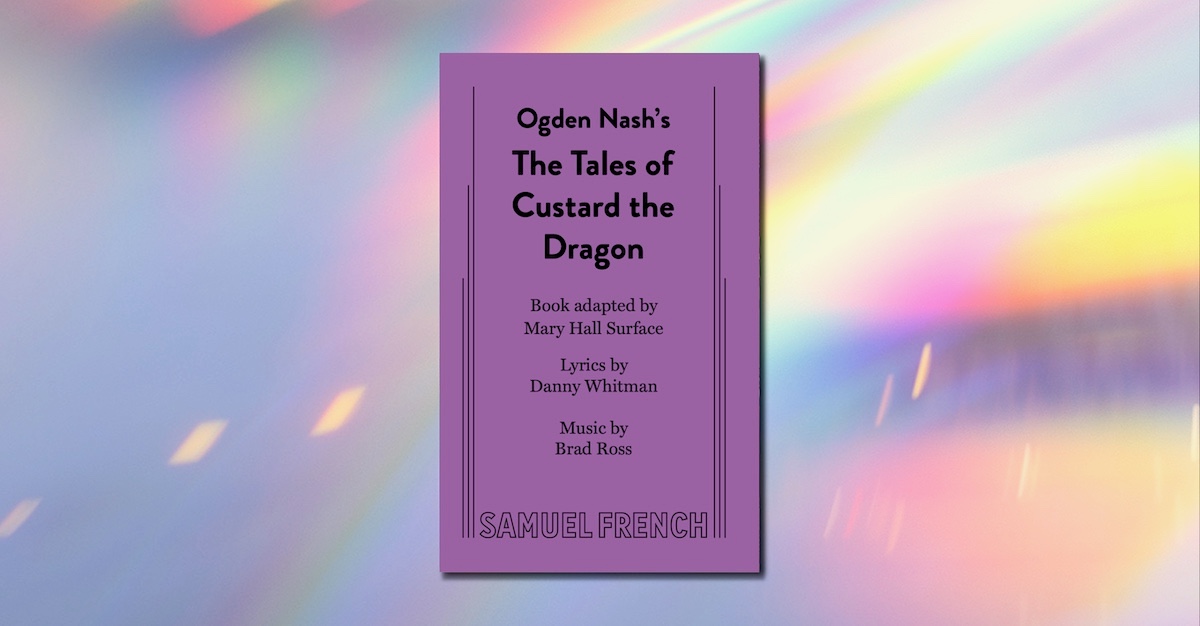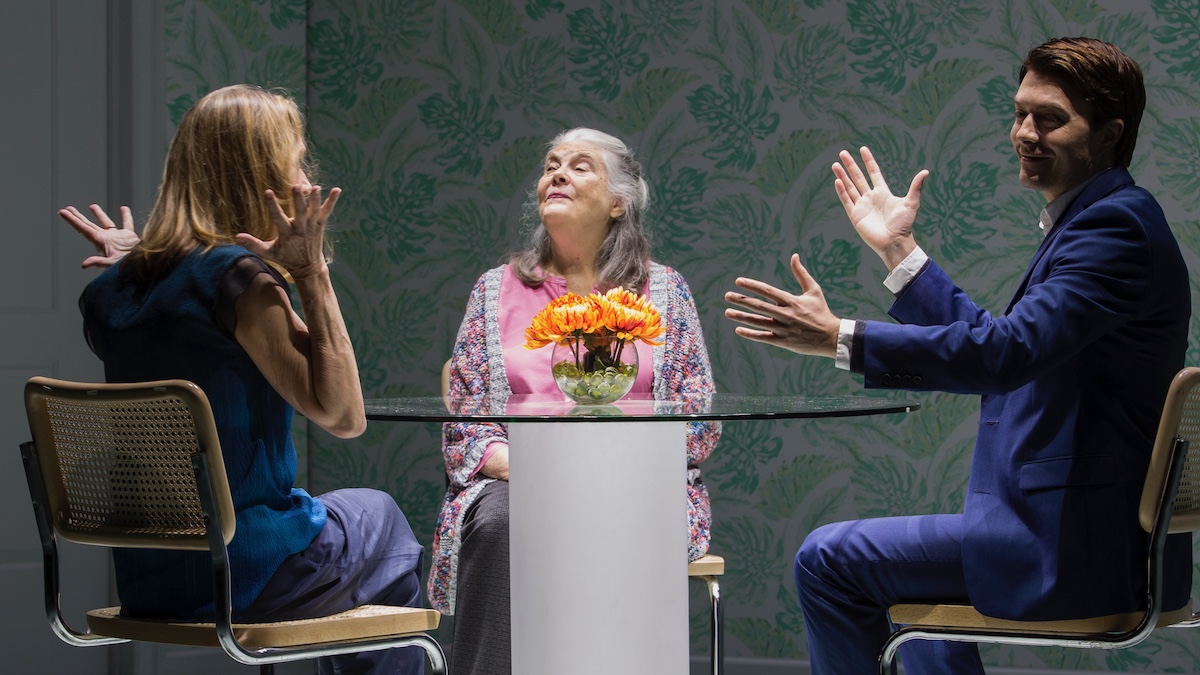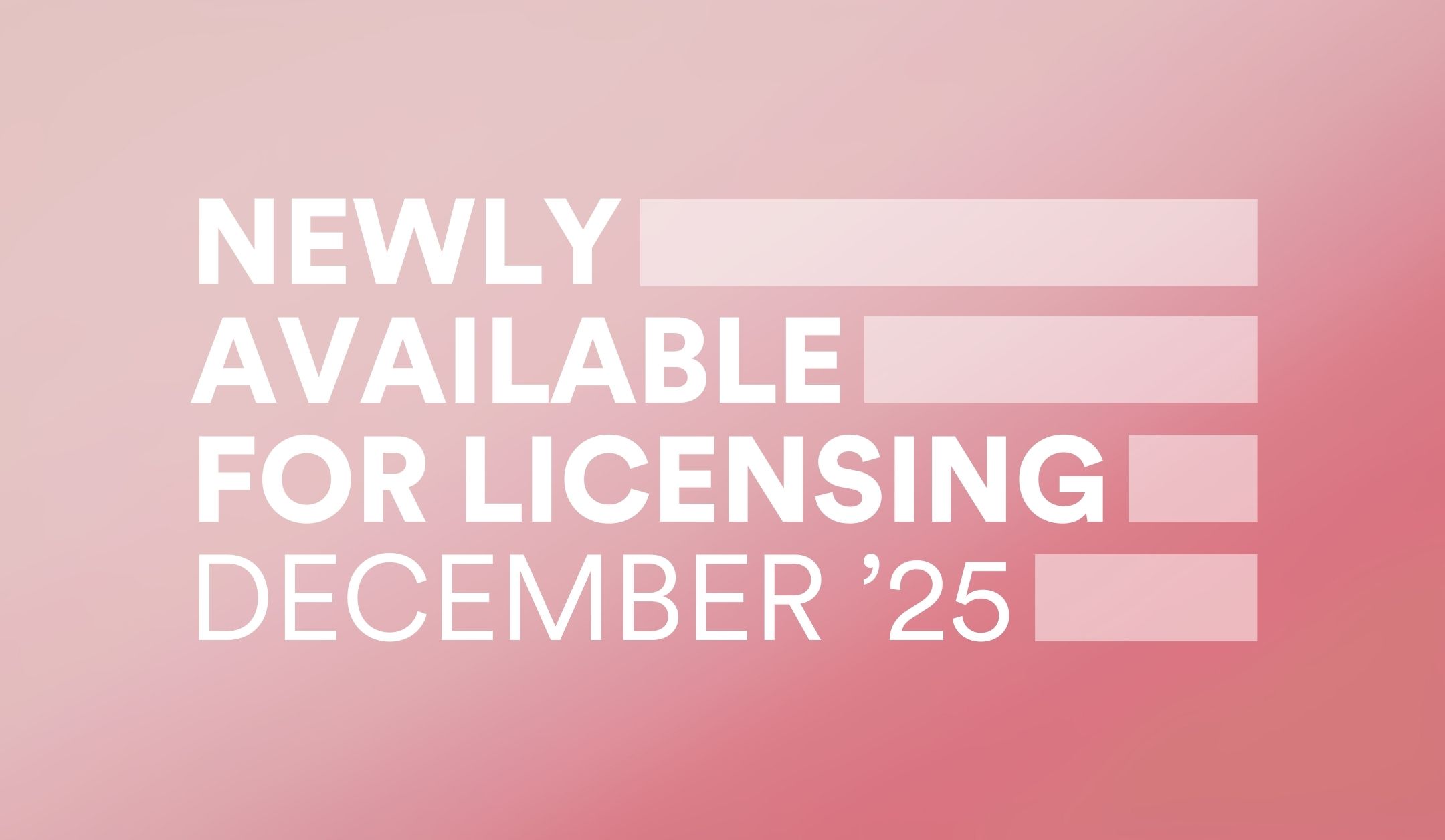
The Tales of Custard the Dragon (US) is a delightful family musical based on the whimsical stories by Ogden Nash. Commissioned and originally produced by the John F. Kennedy Center for the Performing Arts in Washington, DC, the musical sees a most unlikely hero discovering true courage. We recently connected with two of the show’s authors, composer Brad Ross and book adaptor Mary Hall Surface, to discuss their meaningful collaboration.
Brad, the characters in this show are adorable. I so enjoyed getting to know them. For people unfamiliar with the show, how would you describe the story?
Brad Ross (BR): For me, The Tales of Custard the Dragon is a story about learning to be brave even when you’re afraid. It’s a story about conquering your fears.
Mary Hall, you’ve done such a thoughtful job of theatricalizing this tale, finding a balance in its serious nuances, as the piece is geared to a family audience. Can you talk about that process?
Mary Hall Surface (MHS): I have profound respect for children, their intelligence, and their capacity to engage with material that is challenging and nuanced. I never, ever speak down to them. Rather, I strive to create theatrical experiences that address children’s greatest joys and imaginings as well as their fears and forebodings. And by doing so, my plays speak to all audiences, for the essential emotional journeys of childhood remain within all of us and are ripe for theatrical exploration throughout our lifetimes. Of course, I embrace humor and delight. But at the heart of my process is a desire to ensure that both children and adults see and feel their own lives in the story and discover and grow along with the characters.
Brad, tell us about your collaboration with lyricist Danny Whitman, whose lyrics are so insightful. How did they guide the musical styles you chose to employ for each song? Were any of the lyrics particularly challenging for you to compose music for?
BR: Great question! First, it’s worth mentioning that this show began with two complete musical settings of Nash’s two books. In other words, I had already set every word of The Tale of Custard the Dragon and Custard the Dragon and the Wicked Knight to music as extended “songs.” There are sections of the show using portions of these two works: Nash’s words sung with my music. The main musical theme of the show is lifted straight from these pieces. Otherwise, Danny and I wrote original songs based on the needs of the story as devised by Mary Hall. I composed the music first. I guess my music was guiding Danny (instead of the other way around).
The pace in certain songs is quite fast, carrying the words quickly to the end — for example, when Blink sings “Mouse.” What led you in that direction when composing the music?
BR: In the case of “Mouse,” we knew we were writing three “I Am” songs as part of “Belinda’s School of Bravery”: “No Ordinary Dog” for Mustard the Dog, “I Saved the Day” for Ink the Cat, and “Mouse” for Blink the Mouse. This was a fun opportunity to compose music that would define the energy and spirit of Blink’s character. I think Danny captured that in his wonderfully clever and intelligent lyrics.
Mary Hall, can you talk about your approach to adapting time-honored tales? Do you feel a responsibility to honor the source material of Ogden Nash while making the new piece unique?
MHS: In any adaptation, my first responsibility is to the spirit of the source material. In The Tales of Custard the Dragon, we have retained much of Ogden Nash’s original text because it so beautifully captures the dynamics among the characters. And in blending two of the original books, we took the opportunity to imagine a journey for all the characters through a deeper understanding of bravery and courage, and the difference between the two. I believe our approach enlarges the heart of Nash’s stories by inviting audiences into a world where the stakes are very high and the outcomes are transformative.
Relatedly, what is it that you most like in the process of collaborating with a composer and a lyricist? What are the qualities you look for in songwriters when deciding to sign on for a collaboration?
MHS: I enjoy being the “spine” of a musical — the structure on which the story is built through music, lyrics, and spoken text. I’m always eager to collaborate with composers and lyricists who are storytellers at heart. I love seeing how each of us brings our “voice” into the process of creating a whole, unified world.
Brad, tell me about your approach to crafting music that appeals to audiences of all ages.
BR: In all my shows, I compose music for the story and the characters. I have an overall “sound” in my mind that guides me as I compose the music. The fact that The Tales of Custard the Dragon was written for family audiences doesn’t really matter to me. I want to write music that a) pleases me, b) fits the story and characters, and c) fits my “sound” concept for the score.
Mary Hall, you impressively wear many hats in your career. Can you say which is the most special for you and why?
MHS: What is most special to me is sparking questions in my audiences — whether as a playwright, director, museum educator, or producer. I do not offer answers, but rather hope to expand perspective, deepen understanding, and uncover complexity. Through my work, I seek strengthen our empathetic muscles and celebrate and inspire our possibilities as humans and communities.
Brad, as a musician, you, too, wear many hats: as a composer, songwriter, and vocal coach. Which set of duties would you say is your favorite and most rewarding?
BR: While I love working with performers as a vocal coach (and feel like I’m very good at it), the most rewarding hat is composing and songwriting. I have huge respect for the great composers of the American musical theatre; amazing people like Kern, Gershwin, Porter, Arlen, and then Jerry Herman, Charles Strouse, and Cy Coleman, and coming to the present day with someone I admire like Stephen Schwartz. I want to write music that pays homage to those greats.
Do you hope audiences will leave The Tales of Custard the Dragon humming your tunes?
BR: I definitely hope audience members leave the show feeling like they saw a story that held their attention and heard music that sounded good to their ears. Anything beyond that is gravy!
Do you have a favorite song in the musical? Why?
MHS: I love all the songs. And I have a soft spot for the final song between Belinda and Custard, as it captures how they have both discovered so much about themselves and one another. The song also celebrates how we must be brave, even when afraid. I will always remember being in the process of writing the book for this play on 9/11 and returning to my desk that awful morning to find my own bravery in my writing in the face of such profound fear. While a contemporary audience will never know that that was my experience, I do think the kind of bravery we experienced on that day is infused in the play, which resonates today.
BR: I’m really proud of this entire score but I particularly adore “Spread Your Wings,” the same song Mary Hall mentioned. I find it uplifting and inspiring in its music, lyrics, and message.
What do you enjoy about crafting theatre for young audiences?
BR: I love giving young audiences new melodies and musical sounds to hear for the first time!
What about the prospect of staging The Tales of Custard the Dragon do you hope will inspire directors?
MHS: The play can inspire a host of different approaches. In directing the original production at the Kennedy Center, I chose to approach the play with minimal set and costumes, allowing the actors, text, and music to tell the story. Other directors might choose to realize the setting of a child’s room, her pets, and frightening intruders more fully. One of the great strengths of the piece is that it is open to such a rich range of conceptual approaches.
Whose works would say have influenced your efforts, particularly on crafting The Tales of Custard the Dragon?
BR: Mostly, I composed this score from my heart and wanted the musical standards to be high. I didn’t try to write “easy” music for young audiences. There were a couple times I felt I was channeling the compositional style of Sergei Prokofiev and Peter and the Wolf. There’s also a moment when Custard is fighting the Pirate when I looked for inspiration from Igor Stravinsky’s Firebird Suite.
Why do you think The Tales of Custard the Dragon is a good fit for high school and college theatre programs?
BR: For me, the music is sophisticated and challenging. The show is a mini opera because it’s almost completely sung through. I think the score gives high school and college-age performers an opportunity to sing quality music that puts demands on their singing.
What do you hope families will take away from seeing a production of The Tales of Custard the Dragon?
MHS: Families will leave the theater with wonderful tunes in their heads and warmth in their hearts for the characters they have met. I hope they will be inspired to talk together about what it means to be brave, about what we learn from our failures and our adventures, and how are friendships can grow from learning more about ourselves and one another.
BR: I hope audiences leave the theater feeling they can be brave even when they are afraid.
For more information about The Tales of Custard the Dragon, visit Concord Theatricals.

Plays About Technology

Newly Available for Licensing – December 2025 (US)

